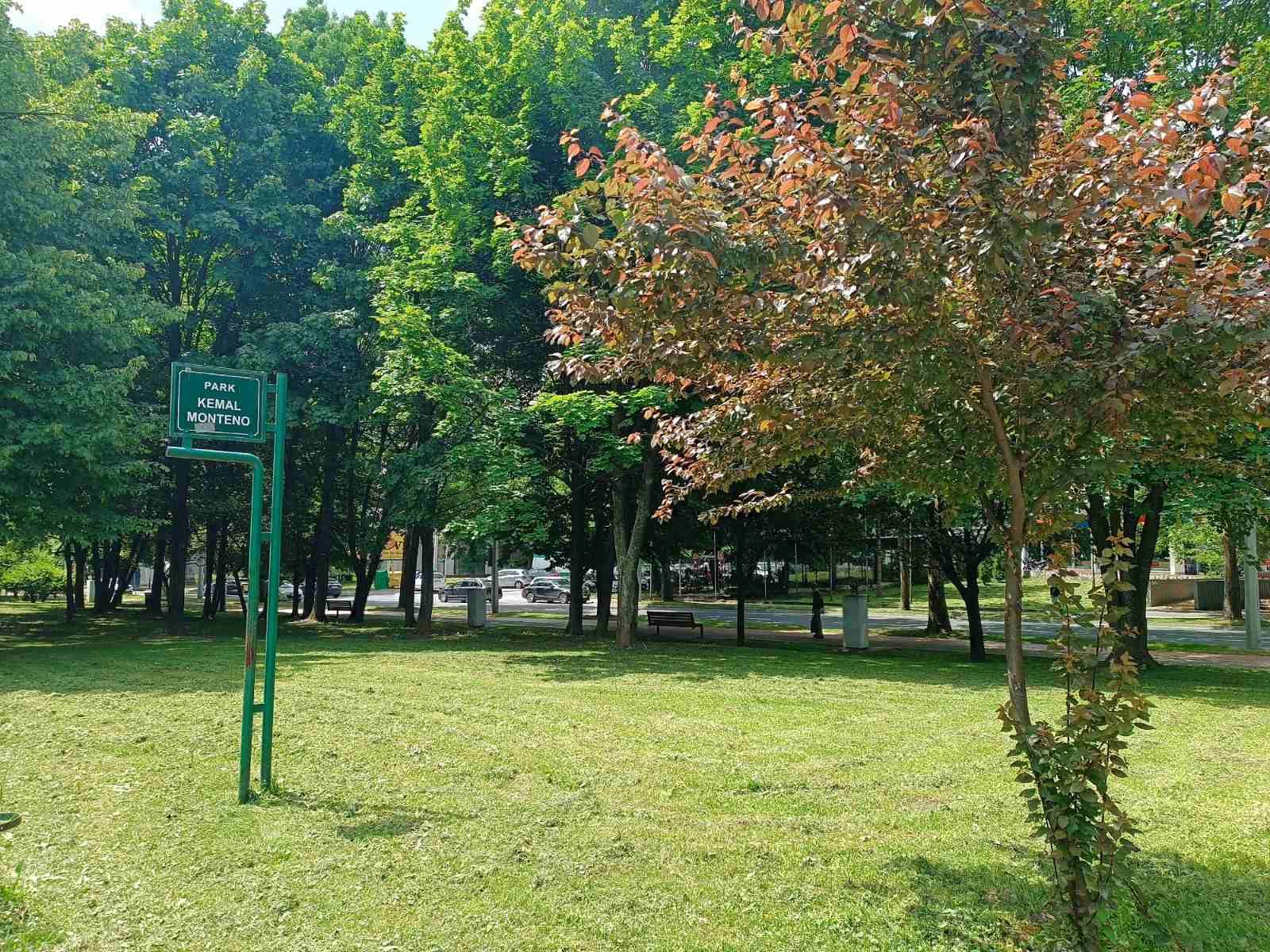
In the Kemal Monteno park in Sarajevo’s Centar municipality, there are busts of officials, statesmen and diplomats from five different countries: Great Britain, Austria, Poland, Malaysia, and the United States of America.
Paddy Ashdown, Alois Mock, Tadeusz Mazowiecki, Madeleine Albright and Mahathir Bin Mohamad are people who, in the most difficult moments for Bosnia and Herzegovina, spoke clearly, demanded action, extended a hand and fought for peace. Today, their names and quotes on the busts testify to a completely different diplomatic history – one in which the international community did not remain silent.
Paddy Ashdown: “Bosnia is under my skin. I can’t imagine what my life would have been without it.”
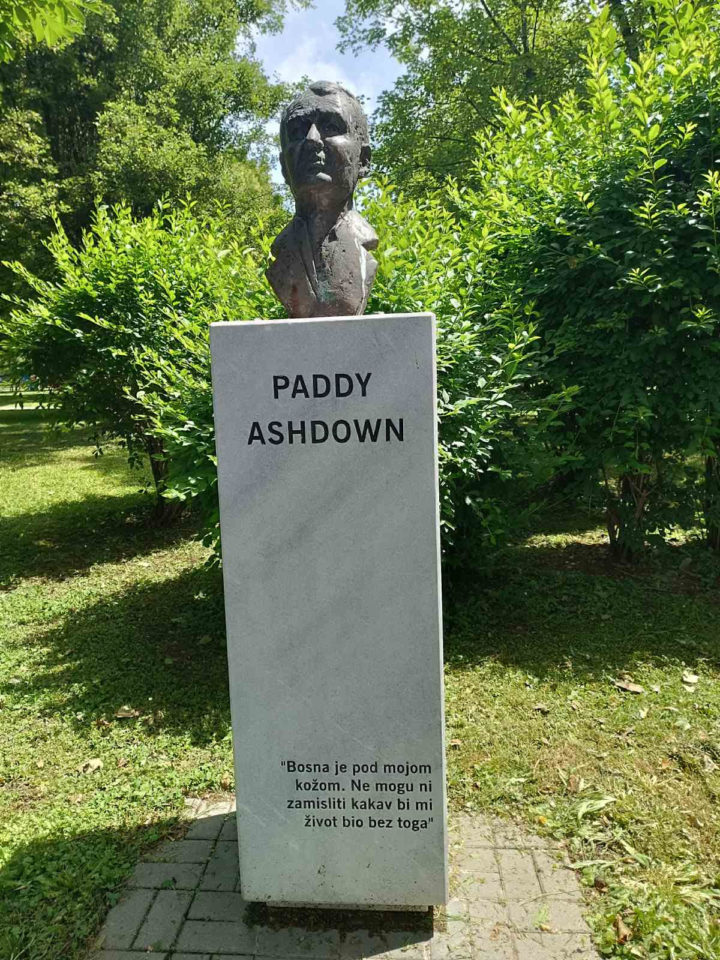
Paddy Ashdown, Baron Ashdown of Norton under Hamdon, was a British politician, former leader of the Liberal Democrats, and one of the most influential international actors in post-war Bosnia and Herzegovina. His role in the region was multifaceted: from testifying about war crimes and decisively implementing reforms to criticizing the international community for its passivity.
During the war in Bosnia and Herzegovina, Ashdown was one of the most vocal advocates of international intervention. He testified several times before the International Criminal Tribunal for the former Yugoslavia (ICTY), where he described the horrors he witnessed. He particularly highlighted the Trnopolje camp, which he described as one of the most terrible places he had seen during the conflict in the Balkans:
“Trnopolje was one of the worst things I saw in the Balkans”, said Ashdown, adding that not only men were kept in Trnopolje but also “the elderly, the sick and wounded, women and children. Without water. They were without hope, desperate.”
His testimony was crucial in the prosecution of those responsible for war crimes.
Ashdown was appointed High Representative to Bosnia and Herzegovina in 2002, succeeding Wolfgang Petritsch. During his mandate, which lasted until 2006, he implemented significant reforms aimed at strengthening state institutions. As High Representative, Ashdown used the so-called Bonn powers, which allowed him to dismiss officials who obstructed the peace process and to impose laws. During his mandate, he dismissed the largest number of political officials in post-Dayton BiH, mostly from Republika Srpska entity, and introduced key reforms, including those in the justice and security sectors.
Ashdown was critical of the Dayton Peace Accords, arguing that while it stopped the war, it created a dysfunctional political system. In an interview for Balkan Insight in 2015, he stated:
“The agreement ended a terrible, terrible dark night, but I don’t believe Bosnia and Herzegovina has yet seen the dawn.”
Ashdown often emphasized his attachment to Bosnia and Herzegovina and its citizens. In interviews, he emphasized that he loved the Bosnian people and that it was the citizens of BiH who helped him understand the complexity of the country. His dedication was also recognized by local leaders, who emphasized his contribution to building peace and stability.
Ashdown died on December 22, 2018, at the age of 77. His death occasioned reflections from around the world, and many described him as a man who left an indelible mark on Bosnia and Herzegovina.
The Advocacy of Austrian Minister Mock
Alois Mock, an Austrian politician and diplomat, was remembered as one of the most consistent European advocates for the survival of Bosnia and Herzegovina during the war of the 1990s. As Austria’s foreign minister from 1987 to 1995, Mock strongly supported the international recognition of Bosnia and Herzegovina, condemned the conflict and ethnic cleansing, and advocated a more active role for the international community in the conflict.
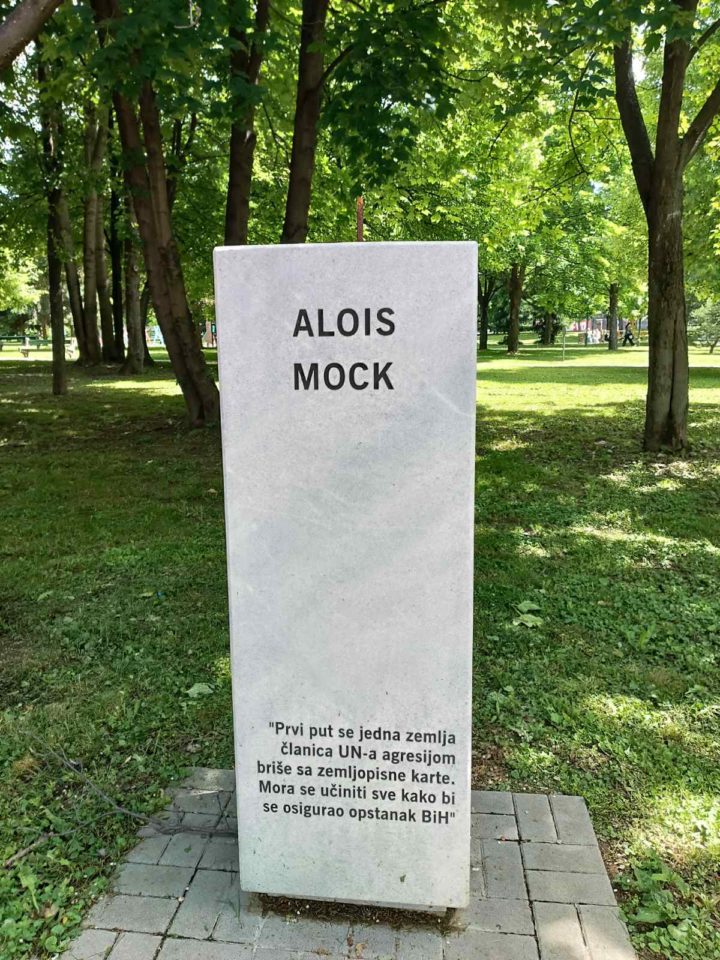
In the midst of the war, Mock warned about the passivity of the international community and the potential consequences. At the conference “International parliamentarians against genocide in Bosnia-Herzegovina” held in the European Parliament in 1994, he pointed out:
“For the first time, a UN member state is being wiped off the map through aggression. Everything must be done to ensure the survival of Bosnia and Herzegovina.”
Mock criticized the arms embargo at the time, claiming that it prevented Bosnia and Herzegovina’s right to self-defense, and called for its abolition in order to enable the protection of civilians.
Although a neutral country, Austria under Mock’s leadership took a clear stance against the conflict in Bosnia and Herzegovina. He repeatedly stressed that neutrality should not mean indifference to crimes:
“Where does aggression and ethnic cleansing lead? Where does the fact that war criminals go unpunished lead? Where does the disrespect of European countries for their own constitutions lead? Where does the use of force to achieve goals lead? The United Nations have failed to protect this people and this country.”
Thanks to Mock’s involvement, Austria was among the first countries to recognize the independence of Bosnia and Herzegovina on April 7, 1992, and the very next day, diplomatic relations between the two countries were established.
Mock’s support for Bosnia and Herzegovina was not only declarative. He actively participated in diplomatic efforts to end the war and provided humanitarian aid. He opened the Austrian library in Tuzla, and joined the fund formed by Simon Wiesenthal, with the aim of providing assistance to orphaned children in Sarajevo Canton.
For his contribution to peace and support of Bosnia and Herzegovina, Mock received numerous awards: an Honorary Doctorate from the University of Sarajevo (1993), the Order of the Dragon of Bosnia (2005), the Mostar Peace Connection Nelson Mandela Award from the Center for Peace and Multi-Ethnic Cooperation in Mostar (200^), as well as a Bust in Kemal Monteno Park in Sarajevo.
Unfortunately, the bust was vandalized in 2025, provoking the condemnation of the Austrian embassy in Sarajevo, which pointed out that Mock was “a statesman who, like few others, contributed to peace and freedom in Europe – especially in Bosnia and Herzegovina.”
In addition to his involvement in Bosnia and Herzegovina, Mock was remembered as a key figure in the process of Austria’s accession to the European Union. As Minister of Foreign Affairs, he applied for membership in the European Community in 1989 and concluded the negotiations on March 1, 1994. He was also the president of the World Conference on Human Rights in 1993, which further confirms his commitment to universal values.
Alois Mock died on June 1, 2017, at the age of 82. His legacy remains deeply etched in the collective memory of Bosnia and Herzegovina as a symbol of international solidarity, principled politics, and the fight for justice.
A Sign of Protest Against the Great Powers
Tadeusz Mazowiecki, the first prime minister of Poland after the fall of communism and one of the key architects of the democratic transition in Eastern Europe, was appointed in 1992 as the United Nations special rapporteur for human rights in the former Yugoslavia. His mission was to document and report on human rights violations during the war in Bosnia and Herzegovina, and his dedication to justice and truth quickly set him apart as a moral authority in the international community.
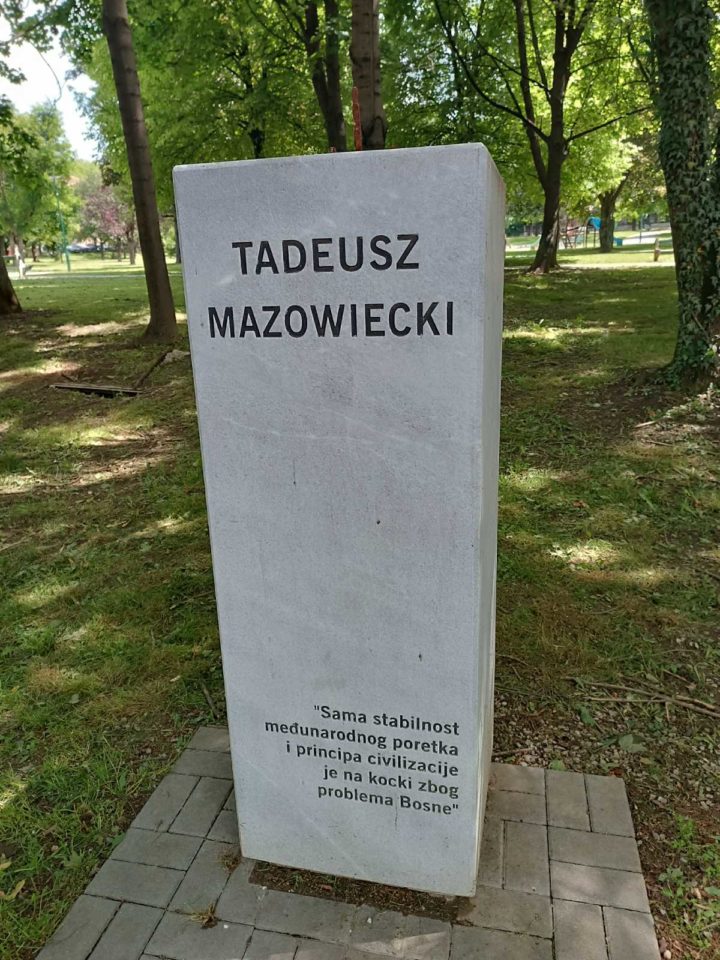
Mazowiecki did not hesitate to criticize even the United Nations itself when its actions or inaction contributed to civilian suffering. After the fall of the protected zones of Srebrenica and Žepa in July 1995, where genocide and mass crimes against the Bosniak population were committed, Mazowiecki resigned from his position. In his resignation letter addressed to UN Secretary General Boutros Boutros-Ghali, he wrote:
“One cannot speak about the protection of human rights with credibility when one is confronted with the lack of consistency and courage displayed by the international community and its leaders. The very stability of international order and the principle of civilization is at stake over the question of Bosnia.”
His resignation was a strong protest against the passivity of the great powers and international institutions that failed to prevent the genocide in Srebrenica. Mazowiecki sent a clear message that moral responsibility cannot be neglected in the name of political pragmatism.
Tadeusz Mazowiecki died in 2013 at the age of 86, leaving behind a legacy of fighting for human rights and dignity.
“I Am From Sarajevo!”
Madeleine Albright, born in Prague, was the first woman to hold the position of US Secretary of State. During her rich diplomatic career, she particularly stood out during the war in Bosnia and Herzegovina, where she was a strong advocate of international intervention to stop the conflict and protect the civilian population.
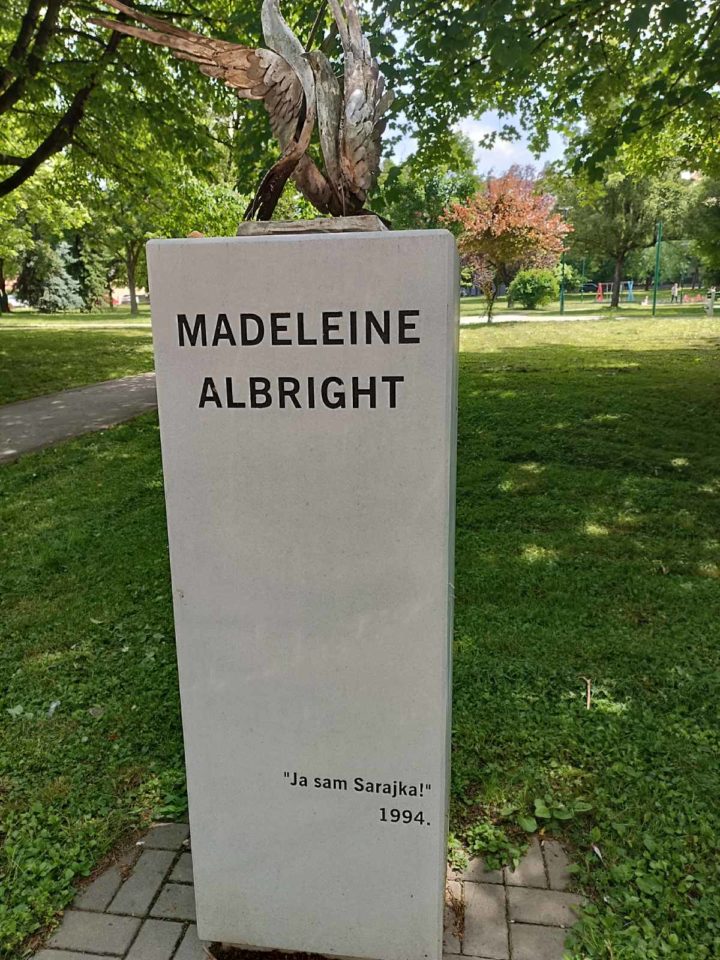
During a visit to besieged Sarajevo on July 4, 1994, Albright declared: “I am from Sarajevo!”
This statement, delivered in front of the then American Embassy, became a symbol of solidarity and support for the citizens of Sarajevo, who were going through the longest siege in modern history. Albright thereby sent a strong message that the United States of America stands by Bosnia and Herzegovina in its struggle for survival and sovereignty.
As the US ambassador to the United Nations, Albright advocated the “lift and strike” policy, which entailed the lifting of the arms embargo for the Army of the Republic of Bosnia and Herzegovina and the launching of military strikes. Her determination and principles were crucial in mobilizing the international community to take concrete steps to stop the war.
For her contribution to peace and support for Bosnia and Herzegovina, Albright was declared an honorary citizen of Sarajevo in 2008. A bust of her was erected in the Kemal Monteno Park in Sarajevo, on which the words “I am from Sarajevo” are engraved as a permanent reminder of her solidarity and friendship.
Madeleine Albright passed away in 2022 at the age of 84.
Contribution to Peace and Multi-Ethnicity
During the war in Bosnia and Herzegovina, Mahathir Bin Mohamad was one of the most vocal world leaders to condemn ethnic cleansing and the international community’s inaction. His words from 1994 remain memorable:
“Ethnic cleansing of Bosnia-Herzegovina must be stopped or forever must those who mouth platitudes about democracy and human rights cease and desist from their pretense at righteousness.”
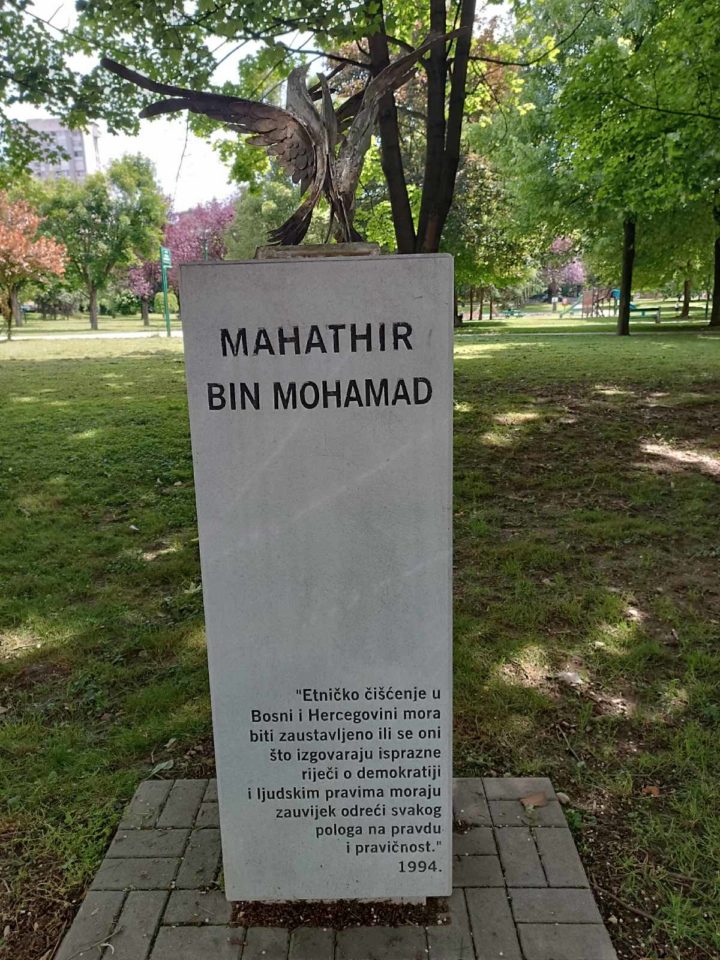
Malaysia, under his leadership, was among the few countries that openly criticized the United Nations for its ineffectiveness in protecting civilians in Bosnia and Herzegovina. Mahathir has often pointed out the hypocritical standards of the West, stressing that the international community has failed to deal with war and genocide.
In June 1995, Mahathir ordered Malaysian soldiers in UNPROFOR not to surrender, criticizing the United Nations for its indecision and lack of action to protect civilians. He also called for the lifting of the arms embargo.
Mahathir’s support was not merely rhetorical. Malaysia sent more than 1,500 soldiers to the United Nations peacekeeping force in Bosnia and Herzegovina, which represented one of the largest contingents outside of Europe. In addition to military aid, Malaysia opened its doors to refugees, allowing them to stay visa-free and sheltering them during the worst days of the war. Mahathir was also instrumental in arranging the 1993 Organization of the Islamic Conference (OIC) summit in Karachi, where the need to provide assistance to Bosnia and Herzegovina, including military support, was discussed.
As a sign of gratitude for his selfless support, a bust of Mahathir bin Mohamad was unveiled in Sarajevo in 2020 in Park Kemal Monteno. His words from 1994 are engraved on the bust, which still resonate strongly today. The unveiling of the bust was attended by wartime members of the RBiH Presidency, Ejup Ganić, Stjepan Kljujić, and Mirko Pejanović, who highlighted Mahathir’s key role in international efforts to recognize Bosnia and Herzegovina as a multi-ethnic and sovereign state.
Mahathir bin Mohamad is remembered as a leader who did not turn his head in the face of injustice but acted decisively and with principle. His support for Bosnia and Herzegovina during the most difficult moments of its history testifies to the strength of international solidarity and the importance of moral leadership in global politics.
The busts of Ashdown, Mock, Albright, Mahathir and Mazowiecki were unveiled in 2020 and are the work of academic sculptor Enes Sivac. The project and financing was provided by Sarajevo’s Centar Municipality.
_______________
This text was published with the financial support of the Embassy of Austria in BiH. The content is the sole responsibility of the author and does not necessarily reflect the views of the Embassy of Austria in BiH, Post-Conflict Research Center or Balkan Diskurs.






